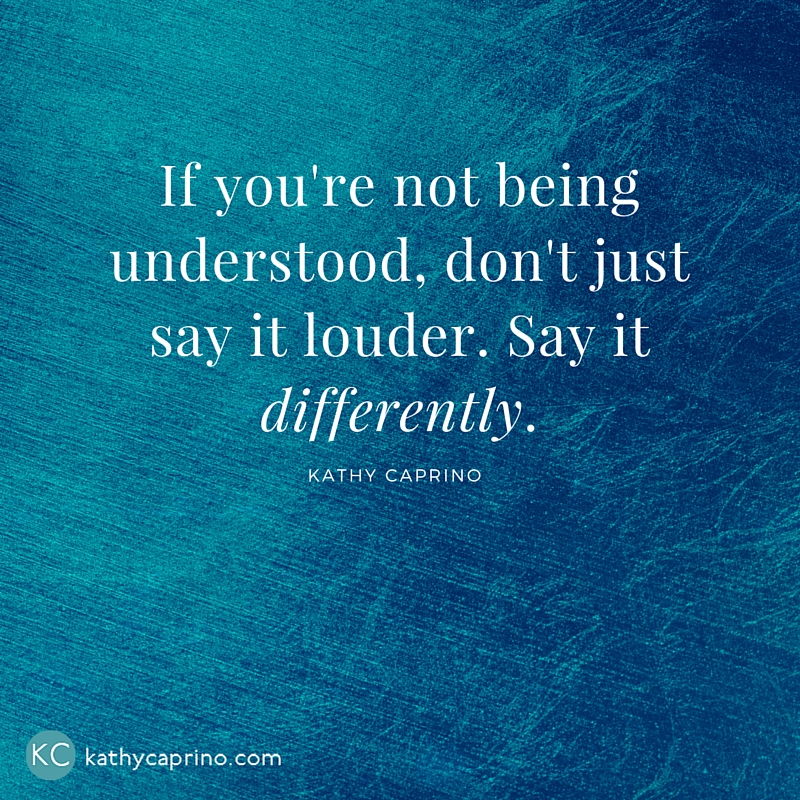This week, I had an experience with a customer service individual that reminded me of something very important that so many people forget (or actually never learned in the first place). In truth, I spent many years engaged in less-than-satisfying relationships and communications, not understanding why. Finally, through my training as a marriage and family therapist, I learned more about communication theory, power dynamics, systemic thinking, and effective interrelating, and things became much clearer. Sadly, I wasted a lot of time in my younger years struggling with not being heard, valued and accepted.
The key concept I’d like to share is this:
If you aren’t being understood, it’s not the listener who needs to change, it’s you.
So often – and particularly when we’re agitated, frustrated or threatened – we try desperately to get our point across by communicating what we believe, and then if it’s not working, we repeat it louder, with more emotion and frustration. But that never works.
Yes, what you’re sharing makes sense to you, but for some key reason, the listener isn’t getting it – either your language is unclear, your emotional reactivity is getting in the way and pushing them away, or in actuality, you aren’t making rational sense, even though you swear you are.
This month, watch yourself in conversation and communication. How is it going for you? Do you feel heard, valued and understood, or do you seem not to be able to communicate powerfully or with authority and clarity? Do people gravitate to you and your messages and resonate with them, or do they resist you and get defensive and irritated at you, and push back all the time? Whatever the case, it’s your communication style you have to examine.
Below are four ways to make your communications more compelling, engaging and clear, even in tense interchanges, so that you’ll be heard and understood, and valued.
Neutralize your defensiveness and emotionality
Watch and control the tone of your voice, and the language you choose to use. I’ve found as a professional writer that every single word we choose has a palpable “energy” to it, and powerful connotations that affect the receiver deeply. And the emotion behind the words we use comes out loud and clear, even if we’re not aware of it.
Most of us know what the energy of our words “feels” like, yet we continue to use our words like a weapon. Be careful with every single word – choose carefully, and breathe deeply to calm yourself when you speak, so you can make your point without leaving body parts (or spiritual and emotional injury) in your wake. Once you say something hurtful, it can’t ever be taken back.
Remember that what you know is not necessarily what they know
We all come from a long history of our own special and unique experience, and with that, comes special language, thought, feelings and perception that is very different from what others experience.
When you speak, remember that others may not automatically understand where you’re coming from – how you’re seeing the situation and the world, or how you’re interpreting what’s happening. To build a shared connection that makes room for both of you to thrive, explain how you see the situation as calmly as possible, and open yourself up to the possibility that the listener may see it very differently. Openly accept and value diversity of reaction and perception (and that people will inevitably disagree with you; that’s life). Allowing for difference of thought and opinion is what makes room for positive relationships and growth.
Ramp up your empathy – put yourself in their shoes
I’ve found that empathy is one of the most powerful traits a human can possess, when it comes to how well we live, how we relate interpersonally, and how we experience our dealings with others. If you have no empathy – no ability to step into someone else’s shoes and feel their feelings and what life is like for them and validate them – then you’ll have no ability to build true connection on any level.
If you have no empathy, your communication will be one-sided. It’ll be a monologue, all about you and what you want. You’ll leave no room for what the other person feels, thinks and wants. And you’ll constantly feel hurt and defensive.
There are so many true narcissists today who are utterly devoid of empathy because of their own internal pain and fear. Don’t be a narcissist – ramp up your ability to put yourself in someone else’s shoes, and be open and accepting of being challenged by them. You’re not always right, and continually trying to defending your “rightness” (and proving your worthiness to everyone around you) will eventually leave you utterly alone.
If you truly want to be heard, understood and even inspiring in your communications, stop and get clearer on who you are, what you want to say, and how you can bring more love, openness, gentleness and compassion in your words and actions.
Know your story and your narrative intimately, and how it colors your perception of “reality”
I remember back when I became a therapist, the conversations and interactions I had with my family and friends changed dramatically. Suddenly, everything I was learning in my training about how we think and behave made me “see” the world so differently. I couldn’t help but talk about it all the time, and “therapize” (or should I say, offer advice and help even when it wasn’t asked for, to) everyone around me. That created some big bumps in my relationships.
What I didn’t realize was that I was the one changing, not the world, and not my family and friends. I had to tone it all down, stop talking about what I learned, and shoving it down everyone’s throats. I began to understand then that my own personal story and my own narrative about who I was and had been, was changing, and in that shifting, my perception of reality was transformed.
What’s your personal story and narrative? And is it helping you in the world, or hurting you? Are you thinking about yourself in ways that help you connect with others, or push them away? Are you viewing your life through a lens of negativity, shame and vulnerability, or positivity and strength? When you think of important milestones, do you punctuate the flow of your life with only the damaging, devastating events, or are you able to see the positive too — the whole amazing amalgam of who you are?
How you see and talk about yourself and connect with others is directly related to the story you tell (in your own mind) about who you are and what’s happened in your life. Find new ways to tell a more positive, hopeful and expansive story about yourself – one that fits the facts equally well, but allows for more growth, strength and optimism. If you can do that, your communications and relationships will change for the better, and reflect that more positive view.
To build stronger communications and relationships, join me this Fall in my Amazing Career Project online course. And to get help to heal and thrive after narcissism, join my new Facebook group.





So helpful. I could barely get through the article because each thought made me stop to evaluate failed communications efforts of mine, past and present. I’m sitting here thinking of the different perspectives of my friends, family and co-workers, and thinking of how I should have approached things so differently. I must re-read and practice, practice, practice. Also thinking we all need to apply the concepts to our conversations in this political season. Thank you, Kathy.
Thank you so much Kathy! I know I am not a very empathetic person, so it really is nice to read that this is something I need to work on. I agree with Teresa, I am going to have to re-read and practice this, starting today!
Thank you for reading, Caroline, and for your courage and openness to admit that your empathy could be expanded. I know from your sharing this, that it will be!
Wow, just had a conversation with my son go off track and in reading this I see that I need to be much more aware of my emotion and reactions. He is struggling to prove he can handle everything and I am frustrated when he doesn’t get it done on my timetable! Luckily I recognized my error and apologized and ended the conversation on a good note, I have been working on this but the experience today shows I still have a way to go! Thanks for these tips I can keep as a reference as I work to make this second nature – my go to way to be a good communicator. I love your writing the the podcast Kathy, thanks so much for sharing!
Thanks so much, Mary, for not only reading the post (and listening to our podcasts), but also taking in the messages about how we can connect and communicate more effectively and deeply. That’s no small thing you did – that you could stop yourself, and interrupt a long-standing pattern of communication that you had engaged in as habit, and make a change. Kudos! I’m absolutely sure your son will appreciate and remember your courage and openness to do that. Great role modeling too! Thanks for sharing!
Wow! Kathy is this powerful! Often times I feel like no one understands me, values me, or notice me. And now I’m looking at myself in their eyes and building walls for others to break down rather than me breaking them down. I am an emotional rollercoaster right now, but thank you for this post in helping me to understand why and how I can fix it. It’s been a continuous problem since childhood. It started with my mom when I was a teen and has gradually grown. But I need to tackle this head on. Please pray for me. Thank you.